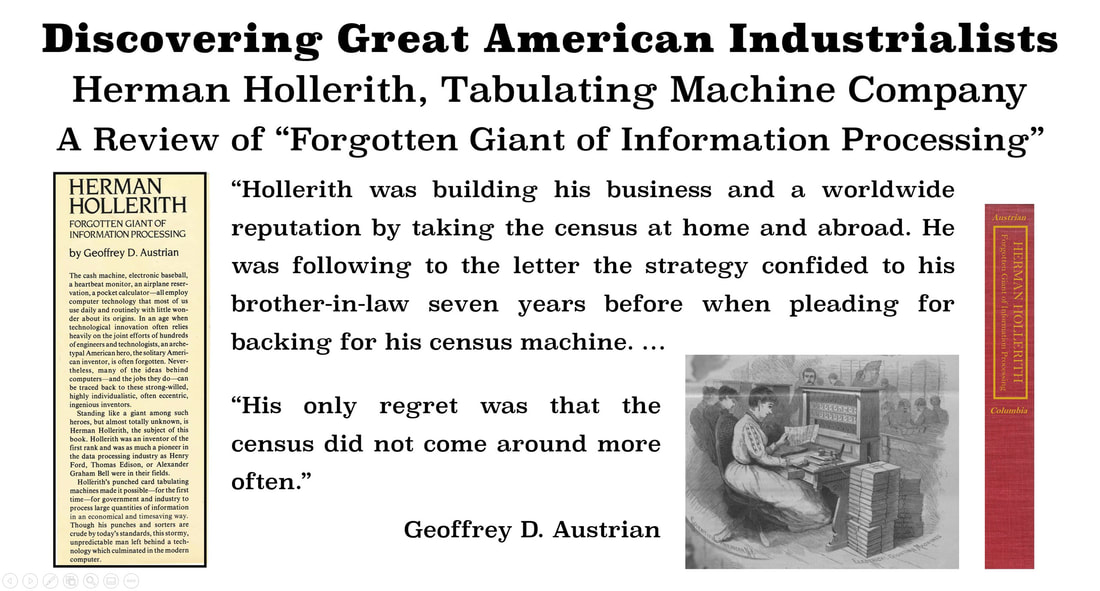A Review of "Herman Hollerith: Forgotten Giant of Information Processing"
- Reviews of the Day: 1982
- Selected Quotes from "Herman Hollerith"
- This Author’s Thoughts and Perceptions
Reviews of the Day: 1982
There were no reviews of the book found in or around the years of publication.
Selected Insights from "Forgotten Giant of Information Processing"
The importance of Herman Hollerith
|
Herman Hollerith answered many of the questions for the early data processing industry, just as surely as did Henry Ford, Alexander Graham Bell, and Thomas Alva Edison for their respective fields. Hollerith's pioneering punched card tabulating machines made it possible for the first time for government and business to process large amounts of information in an efficient, economic, and timely way—to act on the basis of current facts, as one of his associates put it, before they became ancient history.
Why is Hollerith virtually unknown, even in his own country?
Part of the answer lies in the character of the man. He was devoted to his work, his family, and little else. Intensely private, he eschewed the use of advertising, and even of salesmen, to promote his machines. Like Babbage, he was also embittered by his unfortunate experiences with his own government and, possibly for this reason, withdrew further into his private world.
|
So many questions that may still be relevant today
Hollerith's life raises questions that go beyond the scope of this book.
- Is there still a place for highly individualistic, strong-willed, and even eccentric individuals in a society that appears to emphasize "getting along" and functioning as "a member of the team"?
- Would his career, and those of other inventive go-getters, still be possible in a closely regulated society that seems to value short-term security as much as risk taking and the chance for material gain?
- In today's science-based technologies, where the development and manufacture of new products often calls for the joint efforts of hundreds of engineers and technologists, is there still a place for the old-fashioned inventor-entrepreneur?
Editor's note: Does the name Elon Musk come to mind? American capitalism is a wonderful thing, isn't it.
This Author's Thoughts and Perceptions
To understand IBM and Tom Watson Sr. requires an understanding of the history of the tabulating machine and its inventor and entrepreneur, Herman Hollerith. The singular book available for this task is Geoffrey D. Austrian's Herman Hollerith: Forgotten Giant of Information Processing. Mr. Austrian's narrative is a wonderful tale of genius at work. He also connects magnificently Mr. Hollerith and Watson Sr. with some interesting insights unavailable anywhere else. For instance, he writes of an incident when Watson was at NCR:
"He [Tom Watson Sr.] had called upon the Eastman Kodak Company in Rochester, New York, where he had seen some Hollerith machines in action. Impressed, he had gotten NCR to order some on returning to Dayton, but Hollerith, fearful that the company [NCR] would pirate his invention, had refused to oblige ...
"Later, after NCR did obtain some machines, Watson proudly demonstrated them to his wife. Although they failed to work on that important occasion, his enthusiasm was undiminished."
Even though the demonstration failed - - as so many IBM salesman have experienced - - it was a good thing for the C-T-R Company and the future IBM that Watson's enthusiasm was undiminished.
Someday, I may find if this was the foundation for a long-term relationship between George Eastman and Thomas J. Watson Sr. A slice of life story about their relationship through the Society of the Genesee is on this website: [here].
Cheers,
- Pete
"He [Tom Watson Sr.] had called upon the Eastman Kodak Company in Rochester, New York, where he had seen some Hollerith machines in action. Impressed, he had gotten NCR to order some on returning to Dayton, but Hollerith, fearful that the company [NCR] would pirate his invention, had refused to oblige ...
"Later, after NCR did obtain some machines, Watson proudly demonstrated them to his wife. Although they failed to work on that important occasion, his enthusiasm was undiminished."
Even though the demonstration failed - - as so many IBM salesman have experienced - - it was a good thing for the C-T-R Company and the future IBM that Watson's enthusiasm was undiminished.
Someday, I may find if this was the foundation for a long-term relationship between George Eastman and Thomas J. Watson Sr. A slice of life story about their relationship through the Society of the Genesee is on this website: [here].
Cheers,
- Pete


